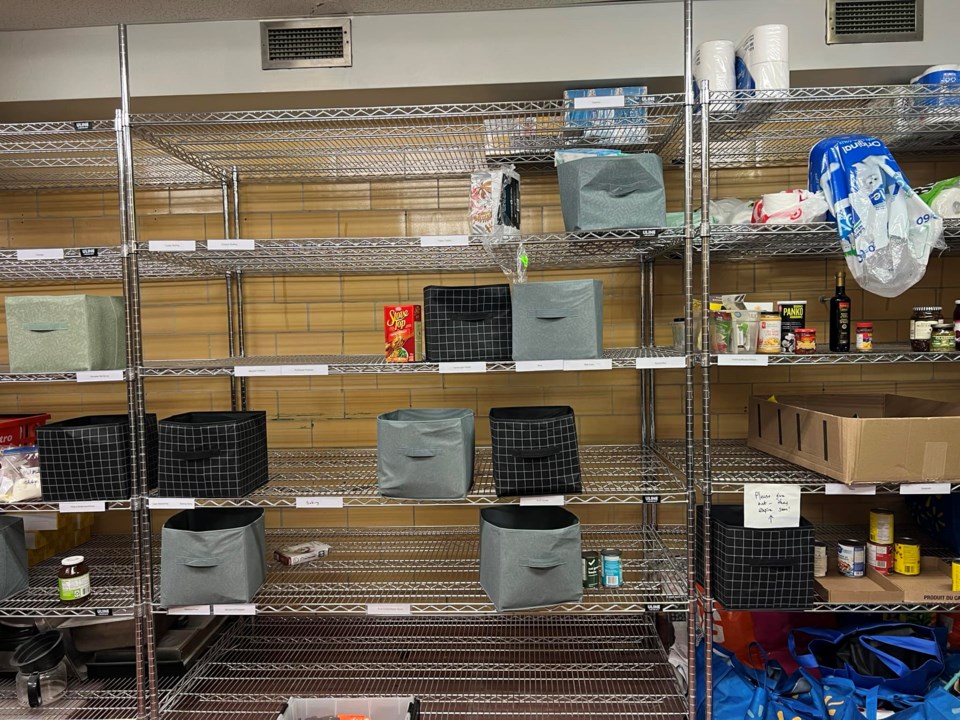Sarnia food banks are struggling to keep shelves stocked, a challenge many of their counterparts across Canada have also been grappling with this year as grocery prices and food insecurity rise, according to a survey.
On some days, River City Vineyard, which operates an emergency food bank and shelter on Mitton St., has had to close because there was no food to distribute, said manager Audrey Kelway.
“We have had to close our food bank because we had nothing,” she told the Sarnia Journal. “We feel so bad because we have had to turn a lot of people away, even today.”
Kelway said River City Vineyard began experiencing an uptick in people accessing its food bank during the COVID-19 pandemic as many found themselves facing work shortages. The situation has snowballed as the housing shortage has left more people on the streets, she added.
The Inn of the Good Shepherd, Sarnia's largest food bank, is facing similar challenges. Echoing Kelway, Executive Director Myles Vanni said access to the Inn's food bank began increasing during the pandemic.
Before the pandemic, if the Inn spent $5,000 a month on groceries, “that was a lot,” Vanni said.
“Since the cost of food has increased, and the amount of people coming in is increasing, we're purchasing $20,000 to $25,000 a month, just to keep food on the shelves,” he said.
Vanni said the Inn's food bank has had a 20 per cent increase in access and a 20 per cent decrease in food donations. He said high grocery prices have also meant people who might normally donate food are unable to or are forced to donate less, due to their own tighter budgets.
“With the inflation in food prices we're seeing, people don't have that little bit of extra money after they get their family's groceries,” he said.
“We have people who, a year ago, might have been giving food to the food bank and they are now having to access it.”
The challenge the food banks are facing is not unique to Sarnia. Food banks across Canada are reporting grocery shortages, according to data from Food Banks Canada's “HungerCount 2024” report.
The report shows nearly 30 per cent of Canadian food banks are running out of supplies, a statistic the organization said is largely stemming from the “one-two punch” of soaring food prices and the housing shortage.
According to the report, there were more than two million visits to Canadian food banks in March alone – a record number.
This figure is almost double the food-bank visits in March 2019 and a six-per-cent increase from 2023. Data from the report also shows 23 per cent of Canadian households are experiencing food insecurity.
The report said on average 33 per cent of those accessing food banks were families with children, an alarming figure Kelway said reflects what River City Vineyard is seeing.
“I would say 25 per cent or more,” she said. “Lots of visits are families with children.”
In a statement, Food Banks Canada CEO Kirstin Beardsley said the housing crisis and the high cost of groceries are making it difficult for food banks to keep supplies on hand.
“This unthinkable rate of growth is not something food banks, nor people in Canada, can sustain,” Beardsley said. “The damage is done, and people need immediate supports to help them recover.”
One ray of hope for both River City Vineyard and the Inn of the Good Shepherd is that the holiday season is approaching and there's typically a surge in food donations as Christmas nears, Kelway and Vanni said.
While all donations are welcome, Kelway and Vanni said non-perishable items, including canned goods, cereal, porridge, peanut butter, rice, noodles, pasta sauce, and fresh fruit and vegetables, are most needed.
“Those are the things we find are helpful to give to people,” Kelway said.
